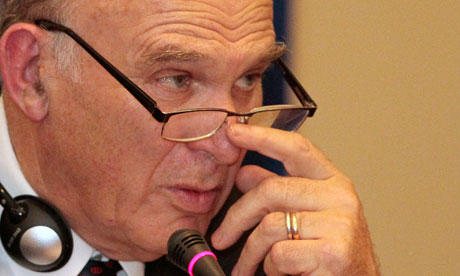Business secretary says he believes fees increase is the correct policy but could abstain as part of collective vote

The party's former deputy leader, now business secretary in the coalition government with the Conservatives, made the pledge as the Lib Dem high command struggles to find a common voice in the parliamentary vote on the fee rise, which is expected before the Christmas recess.
Cable's successor as deputy leader, Simon Hughes, has been pressing for the party to abstain. Nick Clegg, the deputy prime minister and party leader, today refused to say how he will vote.
Labour kept up the pressure on the Lib Dems today. The party used an opposition day debate to call on the government to publish more information on its proposals and to advertise Labour's view that the rise is being used to plug gaps left by cuts in government spending. Labour wants the white paper on higher education to be published before the house is asked to vote on it.
Cable said: "If we all abstain, then that is the position I am happy to go along with. There is an option that we all abstain together and we are considering that.
"My own personal instinct – partly because I am the secretary of state responsible for universities and partly because I think the policy is right – is very much to vote for it. But we have got to vote as a group, collectively, and we are discussing how we do that.
"My position is somewhat different, but I am willing to go along with my colleagues. We are a disciplined party: we work together. We are clearly going through a difficult period over this issue and we want to support each other."
Lib Dem MPs have been wrestling with a pre-election promise not to support an increase but now find themselves presiding over a near-trebling of fees. The coalition agreement allows them to abstain, but many feel they must be true to their promise and vote against it.
A petition signed by 104 former Lib Dem parliamentary candidates called on Cable, Clegg and their fellow MPs to abide by the pre-election pledge to avert "many more years back in the political wilderness".
Yesterday the Welsh assembly announced Welsh students would not have to pay the increase in fees regardless of where in the UK they go to university. Setting out its response to Cable's proposals, Welsh education minister Leighton Andrews said that universities could charge the £6,000 to £9,000 range being charged by English universities.
"The increase in fees for Welsh-domiciled students, whether they study in England or Wales or Scotland or Northern Ireland, will be paid by the Welsh Assembly government," said Andrews. "They will not have to find either £6,000 or £9,000 to study. The public purse will continue to subsidise them."
The Tories published research suggesting that students paying a graduate tax like that proposed by the Labour leader, Ed Miliband, would end up paying back more money than under the scheme proposed by the government. Analysis by new Tory MP Chris Skidmore suggests the poorest graduates could end up paying back £5,000 more during their working lives.
SOURCE
No comments:
Post a Comment